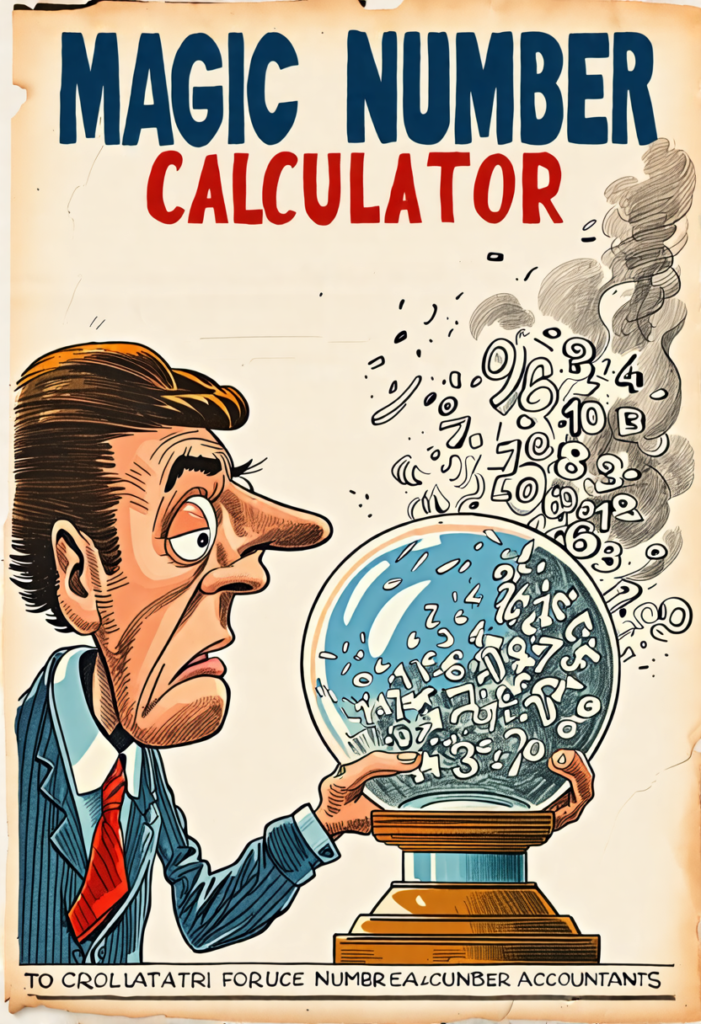Magic Number Calculator
Need to calculate the magic number for your team or opponent?
Our magic number calculator can help you determine the exact number of wins required to secure a baseball championship or advance in the playoffs.

You might be interested in finding Batting Average or Fielding Percentage.
What is a Magic Number in Baseball?
Before we dive into the calculator itself, it’s essential to understand what a magic number represents in baseball. The magic number is a metric used to determine how close a team is to clinching their division or a playoff spot. It represents the combination of wins by the leading team and losses by the trailing team needed to guarantee the leading team’s victory.
The magic number decreases as the leading team wins games or as the closest trailing team loses games. When the magic number reaches zero, the leading team has clinched their position.
How to Calculate the Magic Number
The formula for calculating the magic number is relatively simple:
Magic Number = (Total Games in Season + 1) - (Leading Team's Wins + Closest Competitor's Losses)In Major League Baseball, the total number of games in a regular season is typically 162. However, our calculator uses 163 to account for potential tiebreaker games.
How to Use the Magic Number Calculator
Now that we understand what the magic number represents and how it’s calculated, let’s explore how to use the magic number calculator effectively.
Step 1: Gather Your Team’s Stats
Before you can use the calculator, you’ll need to collect the necessary information. Make sure you have accurate figures for:
- Your team’s current number of wins
- The number of losses for your closest competitor
Step 2: Input the Data
Once you have the required information, input the values into the appropriate fields in the magic number calculator. Our calculator has clearly labeled input boxes for each piece of data:
- “Your team’s wins”
- “Opponent’s losses”
Step 3: Calculate the Magic Number
After entering the data, simply click the “Calculate Magic Number” button. The calculator will automatically apply the formula and provide you with the result in the “Your magic number” field.
Step 4: Interpret the Results
Understanding what your magic number means is crucial for tracking your team’s progress:
- A higher magic number means your team has more work to do to clinch.
- As the magic number decreases, your team gets closer to securing their spot.
- When the magic number reaches 0, your team has clinched their position.
Benefits of Using a Magic Number Calculator
Incorporating a magic number calculator into your baseball analysis toolkit offers several advantages:
- Easy Tracking: The calculator provides a quick and easy way to measure your team’s progress towards clinching a playoff spot.
- Fan Engagement: Using the calculator can increase excitement and engagement among fans as they track their team’s journey to the postseason.
- Strategic Planning: For teams, understanding the magic number can help in planning player rest and rotation strategies as the season progresses.
- Educational Tool: The magic number concept can be used to teach math and statistics in a fun, sports-related context.
- Media Reporting: Sports journalists and broadcasters often use magic numbers to add depth to their coverage of the playoff race.
Real-World Example: The Playoff Push
Let’s consider a hypothetical example to illustrate how the magic number calculator can be used in practice. Imagine it’s late in the baseball season, and the New York Yankees are leading their division. Let’s calculate their magic number:
Current Yankees Wins: 89
Closest Competitor’s Losses: 76
Using our magic number calculator, we input these values and receive the following result:
Magic Number = 163 – (89 + 76) = -2
This negative magic number actually indicates that the Yankees have already clinched their division! Any result of 0 or less means the team has secured their spot.
Advanced Considerations in Magic Number Calculations
While our calculator provides a straightforward way to determine the magic number, there are some advanced considerations in real-world scenarios:
Wild Card Races
In addition to division titles, teams can also clinch wild card spots. Calculating magic numbers for wild card races can be more complex, as it involves multiple competing teams.
Tiebreakers
In some cases, teams may finish the regular season with identical records. MLB has established tiebreaker rules that come into play in such scenarios. These can affect how the final magic numbers play out.
Schedule Strength
While not directly factored into the magic number calculation, the strength of remaining schedules can greatly influence how quickly a team reduces their magic number.
Best Practices for Using the Magic Number Calculator
To get the most out of your magic number calculator, consider the following best practices:
- Regular Updates: Update your calculations after each game to keep track of the most current magic number.
- Multiple Scenarios: Calculate magic numbers for both division leads and wild card races if applicable.
- Contextual Analysis: Always consider the magic number in the context of remaining games and schedule difficulty.
- Fan Engagement: Share magic number updates on social media or fan forums to engage with other fans.
- Historical Comparisons: Use magic number data from previous seasons to compare your team’s current performance to past playoff runs.






